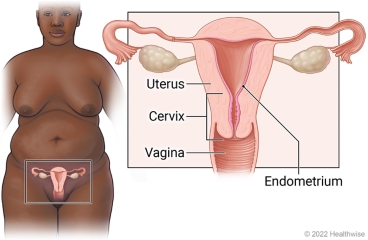
What is endometrial ablation?
Endometrial ablation is a type of procedure that's often used to treat heavy menstrual bleeding. It can also be used for other types of bleeding in the uterus. It's not recommended if you plan to get pregnant.
Ablation works by destroying the lining of the uterus (endometrium). As it heals, the lining will scar. This scarring reduces or prevents bleeding.
You may be given gonadotropin-releasing hormone agonists (GnRH-As) 1 to 2 months before endometrial ablation. This can help thin the lining of the uterus before the procedure.
For the procedure, your doctor may give you medicine to help you relax. You may also get medicine to help with pain. First, your doctor places a tool called a speculum into your vagina. This opens the vagina a little bit. Next, the doctor may put a lighted tube through your cervix. This is called a hysteroscope or scope. It helps the doctor see inside your uterus. Then the doctor inserts a device to destroy the lining. This device may work in one of many ways. It may use a laser beam, heat, electricity, freezing, or microwaves.
Ablation can be done in a doctor's office. Or it may be done in a hospital. It usually takes less than an hour. You can go home after the procedure.
How do you prepare for the procedure?
Procedures can be stressful. This information will help you understand what you can expect. And it will help you safely prepare for your procedure.
 Preparing for the procedure
Preparing for the procedure
- Be sure you have someone to take you home. Anesthesia and pain medicine will make it unsafe for you to drive or get home on your own.
- Understand exactly what procedure is planned, along with the risks, benefits, and other options.
- If you take a medicine that prevents blood clots, your doctor may tell you to stop taking it before your procedure. Or your doctor may tell you to keep taking it. (These medicines include aspirin and other blood thinners.) Make sure that you understand exactly what your doctor wants you to do.
- Tell your doctor ALL the medicines, vitamins, supplements, and herbal remedies you take. Some may increase the risk of problems during your procedure. Your doctor will tell you if you should stop taking any of them before the procedure and how soon to do it.
- Make sure your doctor and the hospital have a copy of your advance directive. If you don't have one, you may want to prepare one. It lets others know your health care wishes. It's a good thing to have before any type of surgery or procedure.
What happens on the day of the procedure?
-
Follow the instructions exactly about when to stop eating and drinking. If you don't, your procedure may be canceled. If your doctor told you to take your medicines on the day of the procedure, take them with only a sip of water.
-
Take a bath or shower before you come in for your procedure. Do not apply lotions, perfumes, deodorants, or nail polish.
-
Take off all jewelry and piercings. And take out contact lenses, if you wear them.
At the doctor's office or hospital
-
Bring a picture ID.
-
You will be kept comfortable and safe by your anesthesia provider. You may get medicine that relaxes you or puts you in a light sleep.
-
The procedure will take less than an hour.
When should you call your doctor?
- You have questions or concerns.
- You do not understand how to prepare for your procedure.
- You become ill before the procedure (such as fever, flu, or a cold).
- You need to reschedule or have changed your mind about having the procedure.
Where can you learn more?
Go to http://www.healthwise.net/patientEd
Enter U581 in the search box to learn more about "Endometrial Ablation: Before Your Procedure".
Current as of: May 5, 2025
Author: Ignite Healthwise, LLC Staff
Clinical Review Board
All Ignite Healthwise, LLC education is reviewed by a team that includes physicians, nurses, advanced practitioners, registered dieticians, and other healthcare professionals.

